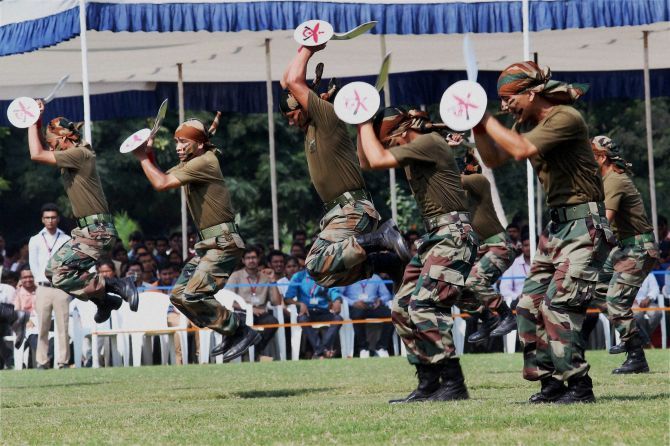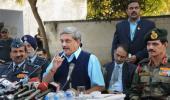Arun Jaitley can make his innings -- notwithstanding its likely length -- a watershed tenure, or just add to the image of the MoD drifting rudderless, says Brigadier S K Chatterji (retd).

Since the time Narendra Modi won a sweeping victory to be anointed prime minister of the world's most populous democracy, the defence ministry -- the MoD -- has displayed far greater professionalism.
It cleared a total of 124 new contracts worth Rs 209,751 crore since Modi took his oath. Most of these contracts were driven by Manohar Parrikar after he took over as defence minister.
Parrikar's 28 month stint as defence minister has come to an end. Goa can be an enticing destination for tourists, but political leaders at the national level may not find it the best alternative to whet their ambitions.
For the BJP, there was little choice though but to gift one of its best performers a retreat from the spotlight in Delhi. The man who will hold the defence ministry's reins till such time as Modi can find another incumbent is Finance Minister Arun Jaitley.
For Jaitley and his successor awaits a multitude of issues that Parrikar had loaded into the pipeline's bore, but will require consistent attention and efforts to see the light at the muzzle end. Foremost, Jaitley has a few subtler details to perceive and address at a more personal level.
Parrikar's strength is best apparent after his departure. The military leadership, which has hardly ever been bothered by a change of defence minister, is experiencing a palpable sense of loss today.
Notwithstanding the faults that critics may list, here was a team man. He took advice, was accessible and held his team-mates' hands when the chips were down.
In the bargain, he won their commitment and also committed a fewer mistakes. Jaitley will need to extend his hand out first and prove to be reassuring for the old team with a new leader now.
We have had no dearth of clean leadership in the defence ministry. Parrikar's predecessor's claim to fame rested on a spotless career.
However, A K Antony was a gross failure at enforcing accountability. Graft is not one way traffic.
If a business establishment indulged in malpractice, there surely was a recipient of favours in the ministry or the forces.
Antony cancelled deal after deal.
Whenever he smelt a rat, he blacklisted companies. But he failed to nail the recipients of the inducements.
Contrarily, Parrikar's defence ministry never hit the headlines. Scams seemed to be out of fashion. The slate, hereafter, needs to be kept clean by the new defence minister.
Parrikar's interactive relationship with the military top brass led to a desirable dilution of the MoD bureaucracy's influence. However, he wasn't able to institutionalise it.
It is a task that Jaitley and the men who hold the Raksha Mantri's baton thereafter will have to apply themselves to.
The integration of the MoD with the service headquarters is at the top of the billing.
Amongst the important issues that require immediate attention and funding are equipment modernisation and operational readiness.
Our depleted ammunition holdings do not even cater for 10 days of combat requirements in many critical varieties.
Some action has been taken, but there remains considerable ground to be covered.
With an unpredictable neighbour to the West and a dragon looming large to the North we can barely afford such a casual attitude in our political leadership.
There is an immediate necessity to build up 30 days war reserves.
The 124 contracts signed after Prime Minister Modi's taking over will need to be monitored for fruition as per contracted schedules.
The barely 7 percent increase in the current financial's defence budget hardly allows for any fresh acquisition.
Of the Rs 274,114 crore defence budget, Rs 78,124.04 crore has been catered for the capital budget after deducting the allocation for OFB, DRDO and DGQA.
Committed liabilities will consume most of the outlay, leaving hardly anything for signing major contracts.
Jaitley is also the finance minister. He surely understands that the readiness state of the army cannot be like a stock exchange's sine curves and mood swings.
The Bombay Stock Exchange can dive down, but the national flag has to be fluttering, afloat, atop, always.
Without adequate budget outlays we don't even get to the starting blocks of being a regional power.
In fact, our ability to defend against a two front threat would become questionable, given the fact that the Chinese defence budget is more than two-and-half times ours.
Major deficiencies that need to be pursued immediately include aircraft for an air force that is 10 squadrons short of its authorised strength.
There are another 11 squadrons of MiG 21 and MiG 27 aircraft that the Indian Air Force needs to decommission in the next 10 years.
Further, the Sukhois are barely at 60 percent serviceability state and they form 10 squadrons.
We need hundreds of helicopters for the three services and the Coast Guard.
The Indian Army needs its 155 mm guns; the overall requirement being close to 2,000 pieces right away, and not just the 145 light howitzers we have contracted.
The army's requirements are many and start with the soldier's basic weapon -- the rifle.
The INSAS, currently in use, was never up to the mark. Nor have efforts been made to upgrade it.
Hence, a nation planning to land a man on the moon is scouting the global market for a rifle that can shoot straight at 300 metres.
The Indian Navy's Scorpene project must run to timelines without the DCNS paper leaks' shadow impinging on it.
There are approximately 60 vessels under construction, and an aircraft carrier that needs to meet the deadline of 2018.
Chinese military strategist Liu Kui has already dubbed India's aircraft carrier strategy a failure.
A decade or more of neglect has resulted in gaping holes in the military's arsenal. It is a situation that cannot be addressed by 1.62 percent of the GDP we have earmarked in the defence budget.
The situation calls for immediate diversion of additional funds for defence.
Jaitley can make his innings -- notwithstanding its likely length -- to be a watershed tenure or just add to the image of the MoD drifting rudderless.
The other issue that needs immediate attention include the anomalies of the 7th Pay Commission.
Benefits of non functional upgrade need to be extended in totality to the armed forces.
The disparities in the disability allowances, allowances for difficult areas and a host of other issues need quick resolution.
Otherwise, we will continue with force modernisation and find ourselves short of leadership and morale.
Let us face a fact: The volunteers for joining up are thinning out.
We have a near insurmountable officer deficiency.
Until and unless a career in the armed forces is as good as the IAS, we will not be able to build an officer cadre capable of driving a techno savvy force.
Amongst the bigger issues are also organisational restructuring and initiation of measures for greater jointness amongst the three services.
Parrikar had ordered a committee headed by Lieutenant General D B Shekatkar that made enough relevant recommendations. It is time to get some of them rolling.
The Defence Procurement Procedure 2016 is as yet incomplete. The chapter on strategic partners has not seen the light of the day.
Apparently, Parrikar had finalised its contours and the chapter is ready for release.
If we are to implement the concept at all, it is time to unveil it.
Too often have we heard from representatives of Modi's government that a decade of neglecting defence preparedness cannot be corrected in such a short period of time.
With defence expenditure recording one of the lowest increases this year, are we sure we mean business?
Finally, the least that is hoped is that the MoD will not regress to its old pace.
It takes a lot of effort to change an organisation's culture and ethos and make it vibrant.
Just a shade of indifference at the top can lead to the edifice crumbling in no time.
IMAGE: Soldiers perform at a 'Know Your Army' event in Ahmedabad, March 20, 2017. Photograph: PTI Photo
MUST READ features in the RELATED LINKS below...











 © 2025
© 2025